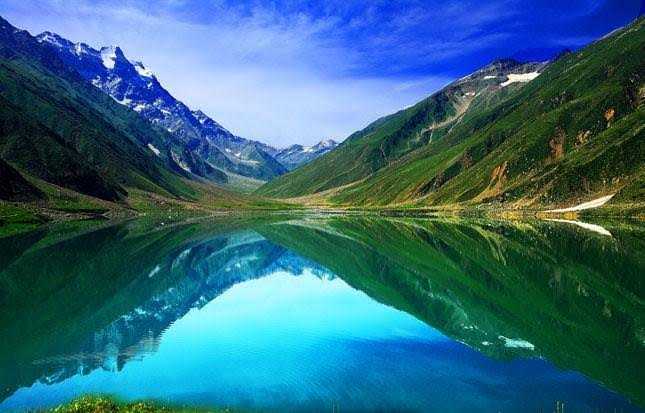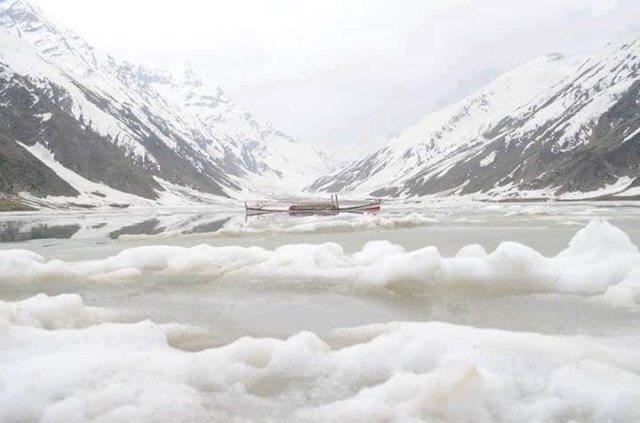Lake saif ul Maluk Info

Lake Saif-ul-Malook – ranked by The Guardian as the fifth best tourist destination in Pakistan – seems like heaven on earth. The greenish-blue crystal clear and freezing water, surrounded by giant glaciers, including Malika Parbat, reflects the beauty of Saif-ul-Malook.
Location
The divine lake lies at the northern end of the Kaghan Valley near Naran, and in the north east of Mansehra district of Khyber Pakhtunkhuwa. It is the highest alpine lake of Pakistan at an altitude of 3,224 metres and 10,578 feet above sea level.

Leisure activities for tourists
The lake is kind of a bowl where multiple glacial waters accumulate. However, it consists of large eco-diversity which includes a rare brown trout fish, bulk amount of blue-green algae, and a variety of water-plants and phytoplankton. Trout fishing is quite popular in Kaghan and in Naran as well.
The magical lake is completely frozen during winters due to heavy snowfall. The ideal time for tourists starts from June to September. The weather of this divine place is extremely pleasant during day time (about 15-20 degree centigrade), whereas at night the temperature drops to three degrees centigrade.
Boating facility is also available for adventure enthusiasts. The experience may be full of excitement but one should be careful because the lake’s depth is still unknown, and there aren’t rescue equipments. So do boating at your own risk! Ponies and horses are also available if one doesn’t want to travel on foot.
Camping at the time of the full moon is like sitting in a fairyland. It is highly recommended for those who want to see the moon shining at it brightest amongst five billion stars in the sky.
Fairy tale of Saif-ul-Malook
The history of this exquisite lake is much famous and attracts the tourists from all over the world. The story is about a prince, Saif-ul-Malook, who fell in love with a fairy princess, Badi-ul-Jamal.
The tale was transformed into a poem by Sufi saint and Punjabi Hindko poet, Mian Muhammad Bakhsh. The same poem was translated into Urdu language by a resident of Balakot, Ahmed Hussain Mujahid. According to the locals it is a place of fairies and demons, who through the extremity of weather display their anger.
A story teller narrated: “I have not seen the fairy, but I’ve seen the glory of God. Every month, on the 14th night of the lunar month, the lake is like a mirror – cradling the mountains, the sky, the innumerable twinkling stars, the glowing orb of the moon – so still, so clear, you can scarcely tell the between reality and reflection. It is a sight to behold! Many a night I have also seen lights, floating lights, a thousand floating lights, here on the slope, where and watched them disappear under the rocks. I have not seen the fairy, Badi-ul-Jamal, but I have witnessed the glory of God.”
Saif-ul-Malook was a prince of Egypt. He had a handsome amount of treasure which he inherited from his forefathers. Inscribed on the treasure were two seals; one bearing the image of Said and the other one being that of Badi-ul-Jamal.
When Saif saw the picture of the fairy he immediately fell in love with her. He then left his home to search for her, a journey that took six years to complete. One day a saint met Saif in a street of Egypt and gave him a Sulemani cap, telling him that it will take the prince to his desired place. The saint told the prince that he would find the fairy in a lake but he had to pass several daunting exams and also pray in order to achieve her, as she was a fairy queen and prince was human. A human eye can never see a demon or fairy as they are “fire borne”.
Saif reached the place and started a Chilla (pray for 40 consecutive days). Day by day his health get worst but he didn’t give up and prayed. After praying for 40 consecutive days without food and rest he became exhausted and weak. It was the 14th night of that month and he thought, “Maybe tonight I’ll see her.” Then suddenly he saw the fairy queen coming along with her maids towards the lake for bath. She was extremely beautiful with dark black hairs and radiant eyes. She was truly a sight to behold.
After talking to Badi-ul-Jamal, Saif came to know that she was trapped in a castle at Koh Qaf by Safaid Deyo (white giant) for the past 10 years. The white giant was also in love with the fairy. After listening to the story of the fairy queen, Saif took her and tried to escape from this valley. When the white giant came to know of this he created turbulences out of anger in this lake, as a result of which flood came in Kaghan Valley. They (the fairy and the prince) hid in a cemetery few miles away from Naran, but due to the flood Saif and Badi-ul-Jamal took shelter in a cave near the lake.
Legend has it that the Ansoo Lake in Kaghan Valley, a few miles away from Saif-ul-Malook, was created out of the tears of the white giant when he found out that the fairy was gone. According to the classic fable, the prince and the fairy queen still live, to this day, in that cave and dance above the water surface on the 14th night of every lunar month.
I would like to be at Lake saif ul Maluk now.

tnk u robert
Hi! I am a robot. I just upvoted you! I found similar content that readers might be interested in:
https://dailytimes.com.pk/87662/saif-ul-malook-the-lake-of-fairies/
Done
Dear @usamakgan555. As you are new member. Let me tell you.
Kala chi ham yao link copy ke no da haghy refrence warkawa. Aw Photo che ham copy ke. Da haghe hm reffrence warkawa. Na warkawal illegal di.
Thanks.